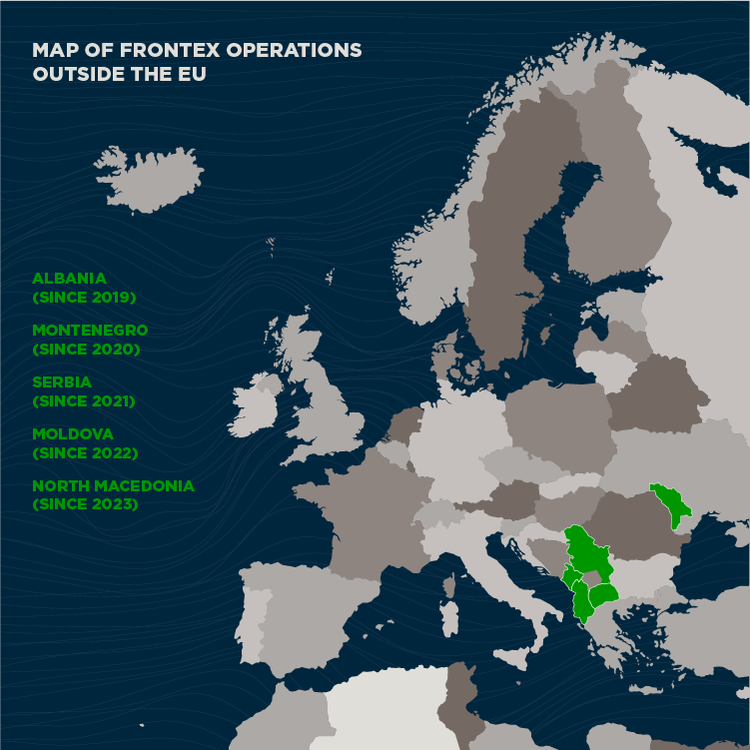Frontex international cooperation spans across all
areas of the agency’s operational work, from information exchange, risk
analysis, joint operations, to return, training, research and innovation.
Where relevant, cooperation takes place based
on
working arrangements signed between
the agency and the competent authorities of the non-EU country.
Our partners take part and contribute to various Frontex activities, and
benefit from the agency’s support in terms of technical assistance and
training.
A wide network of
Frontex-led regional intelligence sharing communities plays a crucial role in
facilitating information and knowledge sharing, as well as joint analysis
between the EU and participating non-EU countries. These include the Western
Balkans Risk Analysis Network, the Eastern Partnership Risk Analysis
Network, the Africa-Frontex Intelligence Community.
Frontex can also support countries neighbouring the EU with Frontex-coordinated joint operations with executive powers. An international status agreement with that country has to be concluded by the EU for this purpose. So far, such operations are being implemented in:
A number of coordination
points have been established at border crossing points between two non-EU
countries that have a working arrangement with Frontex and are activated for a
defined period on the request of the partner countries. Observers from the
border management teams and personnel from participating Member States are then
deployed to these coordination points to facilitate cooperation and information
exchange, particularly in relation to early detection of irregular migration
trends.
Observers from
certain non-EU countries can, with consent of the host Member State, be
invited to participate in the agency’s operational activities.
Frontex Liaison Officers in non-EU countries facilitate dialogue and the
implementation of cooperation on the ground.
EU-funded technical
assistance projects complement and enhance the agency’s external cooperation
work, supporting the development of sustainable border and migration management
solutions in non-EU countries.
Frontex contributes to the implementation of
bilateral and regional cooperation frameworks on migration and fosters regular
dialogue with non-EU countries by contributing to multilateral fora. We support
the work under the Khartoum-, Rabat-, Budapest Processes, the Valetta Summit
follow-up and other Commission-led initiatives. We offer expertise and
contribute to ensuring sustainability of these platforms.
The
agency also continues to facilitate dialogue at operational level through
Frontex-led initiatives such as the International Border Police Conference, a biannual event bringing together representatives of border police
authorities from all over the world.
Transatlantic cooperation remains an important part
of Frontex’s cooperation efforts in responding to the more evolving global threats,
mainly by exchange of knowledge and best practices. The
United States of America, Canada, and Australia are among valuable
interlocutors in this regard. Interconnected with the EU in a wide range of
areas, including on countering of global threats to security at the borders -
such as terrorism and transnational crime, these countries share common
challenges and similar capacities with the EU. The agency continues to
strengthen collaboration with strategic partners through the exchange of
expertise and good practices in areas such as ETIAS, fundamental rights,
operational response and law enforcement.
